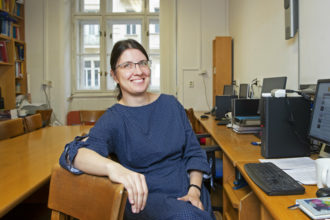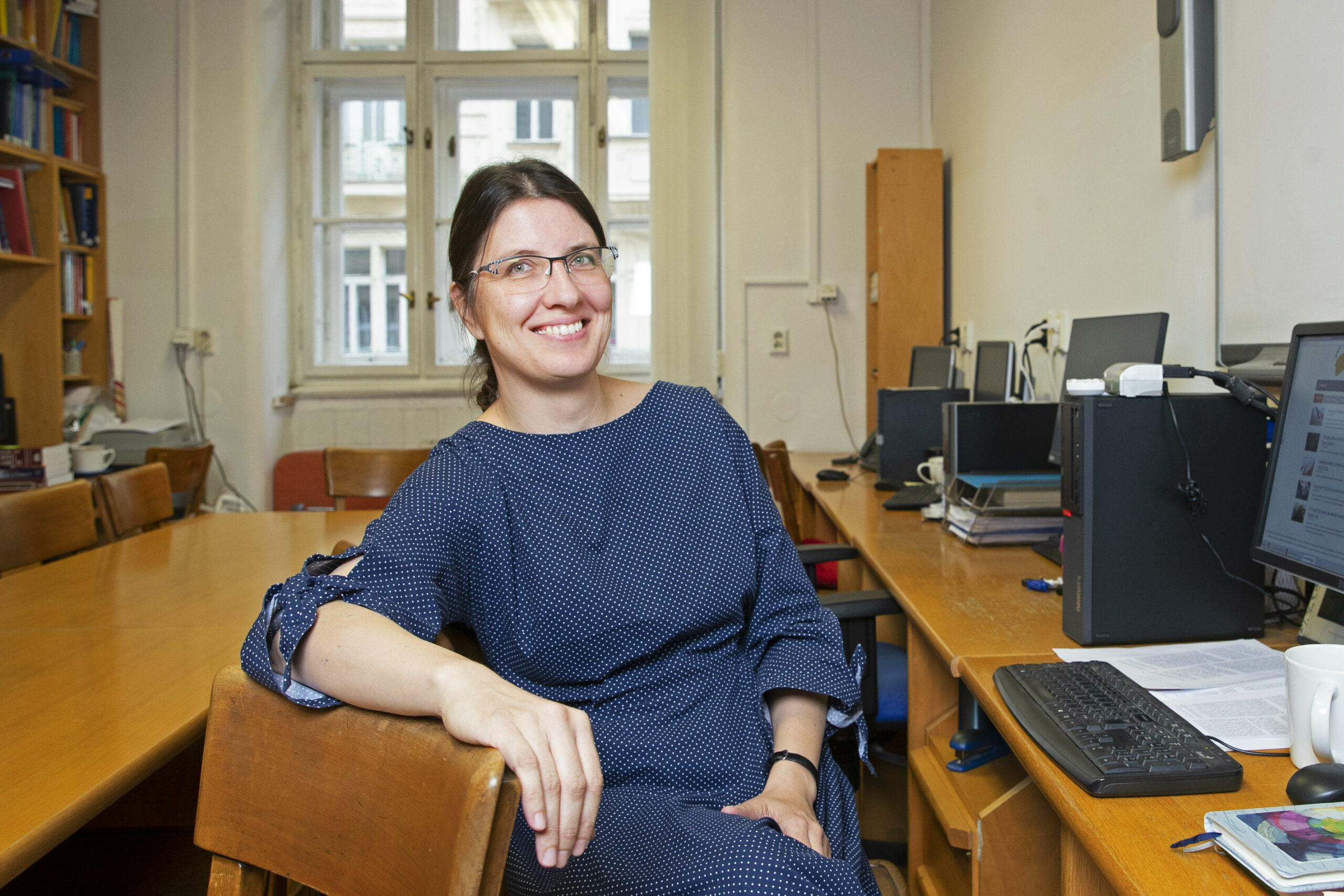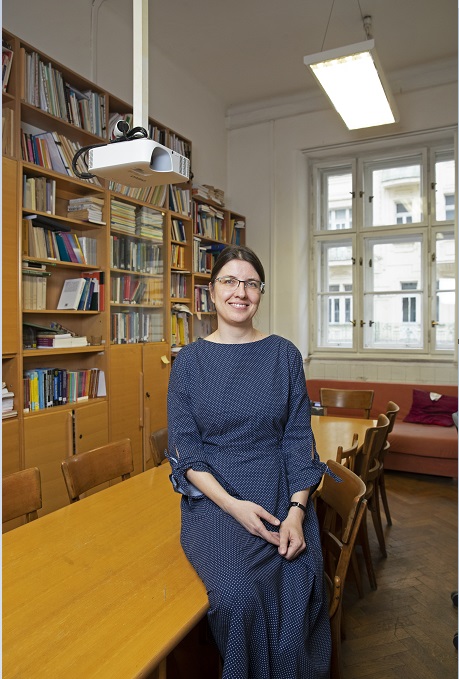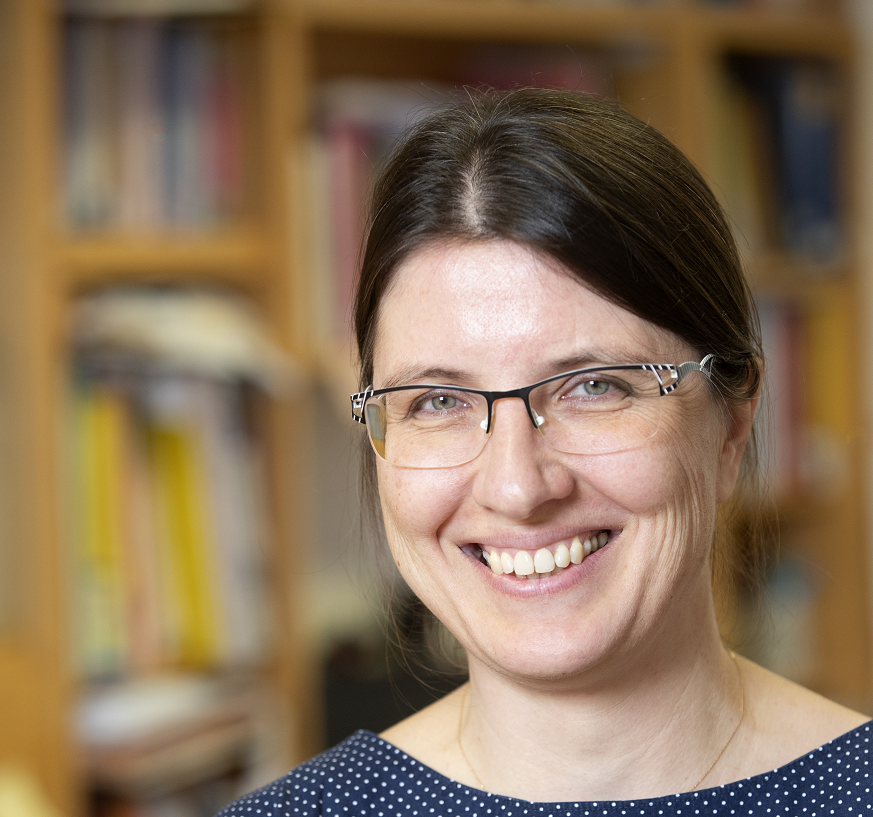
Czech linguist Lucie Saicová Římalová: Women get lost on the career ladder

An enhancement of the Czech language by publishing complete correspondence of Božena Němcová, or a significant contribution to the field of language acquisition by Czech-speaking children. Only the tip of the iceberg of Associate Professor Lucie Saicová Římalová’s credit, who in an interview for the NKC – gender and science revealed her opinion on gender-marked suffixes[1] and generic masculinum, the position of women in Czech science, but also that many women still do not know how to speak about their achievements.
In Czech studies, you focused on cognitive linguistics, but also on language acquisition and the correspondence of Božena Němcová. What is your topic now?
At present I focus on the so-called cognitive-cultural approach to language. For example, I am involved in a Polish project which compares how speakers of different Slavic languages understand certain terms. I specifically deal with the term family of Czech speakers. The results are then compared with the work of colleagues who deal with the term family in Polish or other languages.
How does Czech society perceive your field? Do you feel that public awareness of Czech studies is accurate?
You have now touched on a subject that I forgot to mention. Recently I became interested in the naive or folk theories of language, i.e. the notions of language among users without linguistic education. I focus mainly on how mothers communicate on maternity websites, but I also follow public discussions, for example, on gender-marked suffixes. I think we can see that people who do not have a broader linguistic education often refer to language or linguistics as spelling or vocabulary.
What is your opinion as a linguist on gender-marked suffixes?
On one hand, I believe that it is a phenomenon that our language system allows, but on the other hand it is linked to many different values and associations. With the way I use these linguistic means, I can express my attitudes and opinions. That is why the debate about adding gender-marked suffixes to women’s last-names sometimes does not revolve around language, but rather around the values that I express, or that someone else associates with the specific use. I think everyone should be able to choose the form of their surname.

foto Tomáš Krist
I have noticed that a lot of your colleagues say that Czech language is not equipped to work with women’s surnames without the gender-marked suffix. Do you agree?
I think that if we want, we can express anything. It is true that if someone sought a completely gender-neutral Czech text, it would look strange. But perhaps it is sometimes more important to indicate courtesy and willingness to address everyone. It does not have to lead to strange expressions.
Or to the use of generic masculinum.
Regarding generic masculinum, I personally think that they certainly do not work in all contexts. I have one rather funny photo of girls’ toilets from elementary school, sorry for the example (laughter). The door says ‘Girls’, and when you open it, it says ‘Schoolmasters only’ on the first booth. I think this is the context where the generic masculine doesn’t work.
I would also like to say that I consider topics such as generic masculinum to be very important. Every structure and word indicates something, but many other associations are also linked to them. We all know that when we use two different words for one thing, the message will always be different, even for the words “fireman – firefighter.” That is why it is important to think about it.
Do you think that men and women in your field choose different topics?
Some of the topics, perhaps gender-marked suffixes or gender stereotypes, probably attract more women. In general, I think the choice of topics will be similar, but there may be other approaches. But this is more of my hypothesis, I would have to examine it (laughter).
Despite the fact that on professional level mainly women are concerned with the gender-marked suffixes, it is men who are largely involved in public discussions on this topic. How do you explain that?
That is something that I find interesting too, and I do not know why it is so. With the media, I sometimes wonder if it is because of who is invited, or that maybe women do not want to speak publicly on this topic. It may also be interesting to look at the type of arguments that people in these discussions use.
What is the representation of women and men in linguistics?
It depends on what position. Surely we have an overwhelming majority of female students, women predominate even in doctoral studies, but when we look at our workplace, it is already half and half and, for example, we have only two professors and both are men. Women get lost somewhere on the career ladder.
Why do you think this is the case? Do you think that women for example choose different strategies than men?
I probably can’t say that in a general way, but I can share my experiences and those of my colleagues. Maybe women give up some options beforehand, they say, “I don’t have the time or the strength to do that.” Sometimes I find that female students continue their doctoral studies until they have a child. Then they conclude that it is no longer possible for them to continue, end the studies and start again later. This complicates their careers. So they may choose different strategies, but maybe they are often forced to do so by the system settings.
I cannot not ask; how did you harmonise your work and family life?
My life experience is that you have to make it work somehow. I have a positive experience from my workplace, where they worked very well to schedule my classes for the time the children are at school. Otherwise it’s sometimes very difficult. You need family support and a lot of strength.
Do you think there is a system element whose introduction would make it easier for young female scientists to combine work and family life?
It would be good to encourage fathers to get involved, and encourage those already involved to not feel strange for being the only men with a child at the playground (laughter). Regarding academic and scientific careers, it is important that flexitime is possible. I have noticed, for example, that mothers of small children write e-mails late at night or early in the morning. After that, it is important to support childcare options. Nevertheless, practicalities also play a role, for example when you need to see a doctor with your child. You can order at some places, but elsewhere they will say, “Come on Wednesday at 10:30”. No one cares that it’s the middle of the day and you should work. It’s really hard to organise that.
Have you encountered any prejudices or stereotypes during your career?
In general, I can say that the scientific-academic environment is not very accommodating to people who also have to take care of their family members, whether they are children or older parents. It is also my opinion that care still falls mainly on women, who then have to overcome various obstacles. Unfortunately, I have also encountered prejudices that have often disqualified young women because they were expected to have children. I still believe it disappears and younger female colleagues will no longer experience it. But I remember things like mentions whether a young and beautiful woman could lead a grant, or the expectation that the youngest person wearing skirt in the room would be the one who makes the coffee.

Has the academic environment changed in that way since you were a beginning scientist?
On one hand, I think it has changed, and I hope for the better. There is certainly an increasing number of support opportunities for people in and after the doctoral study. There are efforts to encourage babysitting, but I think some things persist and it’s hard. I often see that some women are no longer afraid to go to doctoral studies while they are pregnant or have a small baby, and they are studying very successfully. Unfortunately, it can still happen that if you become pregnant while your term contract expires, you will not get an extension.
Do you think that the position of women in Czech science has changed during your career?
I’d like to say yes, but women still have it harder. For various reasons, some decision-making positions are more difficult for them to penetrate, even in fields where women predominate in numbers. I think there is still the idea that when you do science, your career starts somewhere and goes up smoothly, as is the stereotype that when you do science, it is always the main thing in your life. Any interruptions or turns are not really counted with. Recently it has started to change, but there are still many obstacles. If you allow yourself to be at home with your children for several years, which I did, although I did not originally plan to do so, it has a strong negative impact on your scientific life.
What about the view of female scientists in society?
If there is still the stereotype that a female scientist is ugly? (laughter) I don’t really know, and yet it’s a topic that I should be interested in. I think it is good that there are more mentions in the public space of women who are devoted to science, who have done something, even in the past, when women had it much harder. That certainly influences the notion of women in science. But when we say “scientist”, the association may still be a man in a chemistry lab, and the idea of a “female scientist” is that she is ugly and can’t cook. But I hope it gets better.
What are your plans for the future? Would you like to be a professor?
I feel that there is a pretty difficult obstacle between associate professorship and professorship. I haven’t considered the professorship yet. At present, as a mother of juveniles, it is very difficult for me to meet criteria such as international mobility.
What do you think of activities like the Milada Paulová Award? Do you think it is important to draw attention to women in science?
I absolutely do think that. I also like that every year, the award is dedicated to a different field. This makes interesting women in the field visible, and if you don’t pursue the discipline yourself, you’ll learn a lot about it. I also think many women still have difficulty in saying, “I’m doing something interesting, I’ve done something important.” If you support this, it’s only good.
[1] In Czech language, women’s last names are differentiated from men’s by gender-marked suffixes –ová/-á. For example, if your father’s surname is Wolf, your mother would be named Wolfová, just like your sister.
